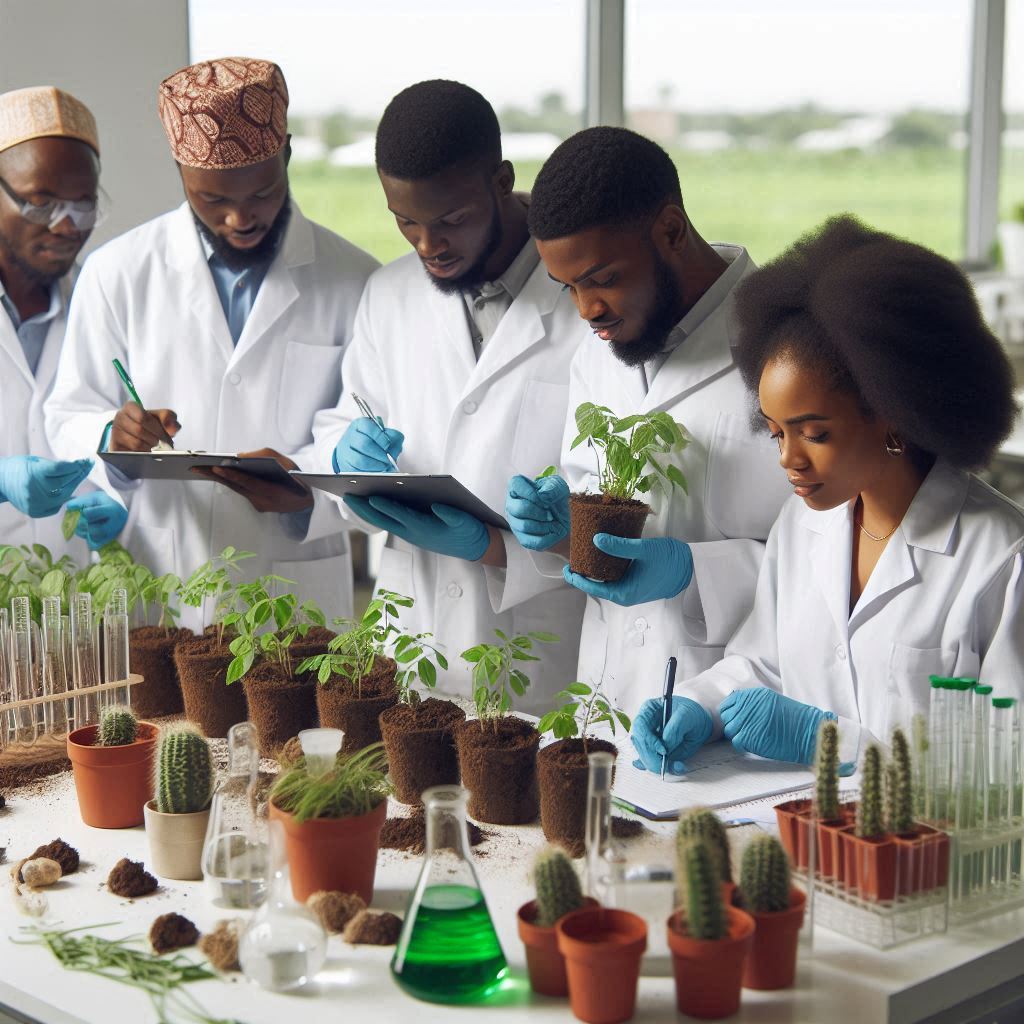Introduction
In the realm of agricultural studies, technology plays a crucial role in enhancing productivity and efficiency.
Technology refers to the application of scientific knowledge for practical purposes, and its integration in agricultural practices can revolutionize traditional methods.
The importance of technology in transforming Nigerian agriculture cannot be overstated.
With the adoption of modern tools and techniques, farmers can increase crop yields, minimize wastage, and improve overall profitability.
This shift towards tech-driven agriculture is essential for the country to meet the growing demand for food in a sustainable manner.
One key aspect of technology in Nigerian agricultural studies is the use of precision farming techniques.
By leveraging data analytics, GPS technology, and remote sensing, farmers can make informed decisions about irrigation, fertilization, and pest control.
This precision approach not only optimizes resource utilization but also reduces environmental impact.
Furthermore, the adoption of mechanized farming equipment has helped Nigerian farmers increase their productivity and reduce manual labor.
With the use of tractors, combine harvesters, and irrigation systems, farmers can cultivate larger areas of land in a shorter time frame.
Basically, technology is a game-changer in Nigerian agricultural studies, offering a path towards sustainable growth and food security.
By embracing innovation and investing in technological advancements, the agricultural sector in Nigeria can overcome challenges and thrive in the modern era.
Technology advancements in Nigerian agriculture
Over the years, Nigeria has experienced significant technological advancements in the agricultural sector, revolutionizing traditional farming practices.
These innovations have not only enhanced productivity but also improved the overall efficiency and sustainability of farming in the country.
Introduction of Mechanized Farming
One of the key technological innovations in Nigerian agriculture is the introduction of mechanized farming practices.
This includes the use of tractors, planters, harvesters, and other machinery to perform various farming activities.
Mechanized farming has significantly reduced the manual labor required in agriculture, increasing efficiency and saving time.
Adoption of Precision Agriculture
Another important technological advancement in Nigerian agriculture is the adoption of precision agriculture techniques.
This approach utilizes advanced tools such as GPS technology, drones, and sensors to optimize field management practices.
Precision agriculture enables farmers to monitor crop health, soil conditions, and irrigation needs accurately, resulting in improved yield quality and quantity.
Implementation of Mobile Technology
The integration of mobile technology in agriculture has also played a crucial role in transforming the sector in Nigeria.
Farmers now have access to mobile applications and platforms that provide valuable information on weather forecasts, market prices, pest control methods, and best farming practices.
This real-time data helps farmers make informed decisions, leading to increased productivity and profitability.
Utilization of Biotechnology
Biotechnology has emerged as a game-changer in Nigerian agriculture, offering innovative solutions to challenges such as crop diseases, pests, and environmental stress.
Genetically modified crops with improved traits have been developed to enhance resilience and productivity in the face of changing climatic conditions.
Biotechnology has the potential to revolutionize crop production and ensure food security in Nigeria.
Embrace of Vertical Farming
Vertical farming is gaining popularity in Nigeria as a sustainable and space-efficient farming method.
This innovative approach involves growing crops in vertically stacked layers or on vertical surfaces, using controlled-environment agriculture techniques.
Vertical farming conserves water, reduces land usage, and allows year-round crop production, making it an attractive option for urban and peri-urban areas in Nigeria.
Introduction of Blockchain Technology
Blockchain technology is being integrated into Nigerian agriculture to enhance transparency, traceability, and efficiency in the supply chain.
This decentralized ledger system ensures secure transactions and data management, enabling farmers to establish trust with buyers and access fair prices for their produce.
Blockchain technology can help eliminate middlemen, reduce food waste, and create a more equitable market system in Nigeria.
Development of Agri-Fintech Solutions
The development of agri-fintech solutions has enabled Nigerian farmers to access financial services and resources more easily.
Digital platforms are now providing farmers with access to credit, insurance, and payment solutions, empowering them to expand their operations and invest in modern farming techniques.
Agri-fintech solutions are fostering financial inclusion and driving economic growth in the agricultural sector.
Overall, these recent technological advancements in Nigerian agriculture have had a profound impact on the sector, enhancing productivity, efficiency, and sustainability.
As Nigeria continues to embrace innovation and digital transformation in agriculture, the future looks promising for farmers and the agri-food industry in the country.
Read: Educational Tech Startups in Nigeria
Bridging the gap between traditional and modern agricultural practices
How technology has helped bridge the gap between traditional farming methods and modern techniques
Technology plays a pivotal role in bridging the gap between traditional and modern agricultural practices in Nigeria.
It has revolutionized the way farmers approach cultivation, harvesting, and distribution.
The impact of this integration on the overall development of agriculture in Nigeria
The integration of technology into agricultural practices has led to significant improvements in crop yields, food quality, and farm profitability.
By leveraging data analytics and artificial intelligence, farmers can identify trends, predict market demands, and optimize production processes, leading to increased efficiency and competitiveness.
Moreover, technology-driven innovations have facilitated the adoption of sustainable farming practices, reducing environmental impact and promoting ecosystem conservation.
Techniques such as precision agriculture and agroforestry promote soil health, water conservation, and biodiversity preservation, ensuring the long-term sustainability of agricultural systems.
Overall, the integration of technology has had a transformative impact on the development of agriculture in Nigeria.
It has empowered farmers with tools and knowledge to overcome traditional challenges and embrace modern farming techniques.
This shift towards technology-driven agriculture not only enhances productivity and profitability but also contributes to food security, poverty alleviation, and rural development.
However, challenges such as access to technology, digital literacy, and infrastructure limitations persist, particularly in rural areas.
To fully harness the potential of technology in agriculture, there is a need for concerted efforts from government, private sector, and development partners to bridge the digital divide and ensure equitable access to technological innovations.
Overall, the integration of technology has facilitated a paradigm shift in Nigerian agriculture, bridging the gap between traditional and modern farming practices.
This transformative change holds immense potential for driving sustainable development, economic growth, and food security in the country.
Read: Online Courses in Curriculum Studies Nigeria
Enhancing crop production and quality through technology
One of the key areas where technology has significantly impacted Nigerian agricultural studies is in enhancing crop production and improving the quality of agricultural products.
This technological advancement has revolutionized the way farmers cultivate their crops and manage their farms, ultimately leading to increased yields and better quality produce.
Benefits of Technology in Enhancing Crop Production
- Increased Efficiency: Technology has allowed farmers to optimize their farming practices, leading to higher productivity levels and reduced waste.
- Precision Agriculture: Tools such as GPS-guided tractors and drones help farmers accurately monitor and manage their fields, resulting in better crop yields.
- Water Management: Technological solutions like drip irrigation systems enable farmers to provide the right amount of water to their crops, improving water efficiency and crop growth.
- Pest and Disease Control: Through the use of sensors and data analytics, farmers can detect and address pest and disease outbreaks early, minimizing crop damage.
- Improved Seed Varieties: Biotechnology has led to the development of genetically modified seeds that are resistant to pests and diseases, leading to better crop yields.
Examples of Technological Tools and Practices
- Mobile Apps: Farmers can access real-time weather information, market prices, and farming tips through agricultural mobile applications.
- Smart Farming Equipment: Tools like automated planters, harvesters, and irrigation systems improve efficiency and reduce labor costs.
- Satellite Imaging: Satellite technology helps farmers monitor crop health, predict yields, and detect issues like drought or nutrient deficiencies.
- Biotechnology: Genetic engineering techniques have led to the development of crops with improved yield potential, pest resistance, and nutritional content.
- Blockchain Technology: This technology enables farmers to track their produce from farm to market, ensuring transparency and quality control.
Overall, the integration of technology in Nigerian agricultural studies has not only increased the productivity and profitability of farmers but has also improved the quality and safety of agricultural products.
As the agricultural sector continues to evolve, embracing technological advancements will be crucial in meeting the growing demands for food security and sustainable agriculture in Nigeria.
Read: Tech-Enhanced Learning in Nigerian Schools

Improving access to agricultural information and resources
Technology has revolutionized the way farmers in Nigeria access vital information, resources, and markets. This has significantly impacted the agricultural sector and the livelihoods of farmers across the country.
Digital platforms
Platforms like agribusiness websites and mobile applications have become popular tools for connecting farmers with up-to-date information on weather patterns, crop diseases, market prices, and best agricultural practices.
Market information
Through technology, farmers can now easily access market information such as demand trends, pricing data, and buyer preferences. This enables them to make informed decisions and maximize their profits.
Training and extension services
Digital tools have made it possible for farmers to receive online training and extension services, eliminating the need for physical travel and reducing costs. This has empowered farmers with knowledge and skills to improve their productivity.
Access to financial services
Technology has facilitated access to financial services such as mobile banking and digital loans, allowing farmers to secure credit for inputs, equipment, and other agricultural needs.
This has enhanced financial inclusion in the agricultural sector.
Networking opportunities
“Social media and online platforms connect farmers with suppliers, buyers, and experts in the agricultural value chain.”
This networking creates opportunities for collaboration and growth.
Generally, technology has played a crucial role in improving access to agricultural information, resources, and markets for farmers in Nigeria.
Farmers enhance productivity and profitability using digital platforms in the evolving agricultural landscape.
Read: Role of Teachers in Curriculum Studies Nigeria
Empowering farmers and enhancing food security
How technology has empowered farmers in Nigeria by providing them with the necessary skills, resources, and support
Technology has played a crucial role in empowering farmers in Nigeria by providing them with the necessary skills, resources, and support to improve their agricultural practices.
- Access to information: Farmers in Nigeria now have easy access to vital information on weather patterns, market prices, pest control, and crop management techniques through technology. This enables them to make informed decisions and optimize their yields.
- Training and capacity building: Various technological tools such as mobile apps, online courses, and virtual training sessions have enabled farmers to enhance their skills and knowledge in agriculture. This has led to increased productivity and efficiency in farming practices.
- Financial inclusion: Technology has also facilitated financial inclusion for farmers in Nigeria by providing access to mobile banking services, credit facilities, and insurance products. This has helped them to invest in their farms, expand their operations, and mitigate risks.
- Market access: Through e-commerce platforms and online marketplaces, farmers can now sell their produce directly to consumers or larger markets without the need for intermediaries. This has enhanced their profitability and enabled them to reach a wider customer base.
Role of technology in enhancing food security and promoting sustainable agricultural practices
- Precision agriculture: Technology such as GPS mapping, drones, and sensors is being used to optimize farm management practices, reduce input wastage, and increase crop yields. This precision agriculture approach helps in enhancing food security by ensuring a consistent and reliable food supply.
- Climate-smart agriculture: With the increasing challenges posed by climate change, technology is playing a vital role in promoting climate-smart agriculture practices in Nigeria. This includes the use of drought-resistant seeds, water-saving irrigation techniques, and climate monitoring tools to adapt to changing environmental conditions and ensure food security.
- Enhanced crop monitoring: Advanced technology tools like satellite imagery and remote sensing are being used to monitor crop health, identify disease outbreaks, and assess crop growth in real-time. This proactive approach helps farmers to take timely actions and prevent crop losses, thus ensuring food security.
- Sustainable farming practices: Technology promotes sustainable agricultural practices such as organic farming, integrated pest management, and soil conservation techniques. By reducing the reliance on chemicals and promoting eco-friendly methods, technology contributes to long-term food security and environmental sustainability in Nigeria.
Certainly! Here’s the paraphrased version:
Technology has empowered Nigerian farmers, enhancing food security and promoting sustainable agriculture.
Policymakers, stakeholders, and the agricultural industry must continue leveraging technology to address farmer challenges and ensure Nigeria’s food security.
Conclusion
In closing, the importance of technology in Nigerian agricultural studies cannot be overstated.
We’ve explored how technological advancements reshape Nigeria’s agriculture, driving productivity, sustainability, and market access improvements.
By harnessing the power of technology, farmers can optimize resource utilization, mitigate risks, and increase profitability.
Precision farming, sensor monitoring, and data analytics revolutionize traditional farming, empowering farmers with informed decisions and environmental adaptability.
Technology connects farmers to markets, reducing inefficiencies and improving access to information and financial services.
Mobile apps, e-commerce platforms, and digital payments empower farmers, transforming agricultural trading by expanding market reach and ensuring fair prices.
Looking ahead, the transformative impact of technology on the agriculture sector holds immense promise for further development and growth.
Continued innovation and investment in research and development are essential to unlock the full potential of technology in Nigerian agriculture.
Nigeria can address existing challenges, enhance resilience, and drive sustainable agricultural development by embracing emerging technologies.
Furthermore, partnerships between government, private sector, and academia are crucial to creating an enabling environment for technological innovation and adoption.




